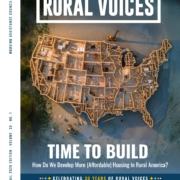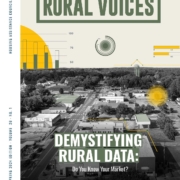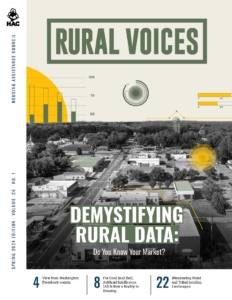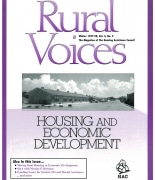Rural Voices: Time To Build: How Do We Develop More (Affordable) Housing In Rural America?
Rural America needs – and deserves – more housing. The vitality of small towns
and Tribal lands across the country depends on it. While often overlooked in
national conversations about housing and community development, rural areas
are home to approximately 60 million people, many of whom are essential workers
in food production, education, energy, healthcare, and public safety. Yet these
communities struggle with an aging housing stock, limited new construction, and
infrastructure challenges.
The healthiest and most vibrant rural places are finding ways to build and preserve
housing that local residents can afford. New home construction is critical to
attracting and retaining a workforce, replacing an aging and substandard housing
stock, recovering from natural disasters and helping people invest in the place
they call home.
HAC hopes this issue of Rural Voices can illuminate how access to data, resources,
and innovations can better enable solid decisions, strategies, and solutions
for adding housing in rural communities across the nation. The rural voices in
this issue include experts, practitioners, policymakers, and community-based
organizations that seek to produce more and better housing in rural America. They
share tools, processes, and advice about building in today’s housing landscape.
Contents
VIEW FROM WASHINGTON
Housing Supply
by Jonathan Harwitz
HAC’s Director of Policy shares his insights on the landscape of affordable housing funding with messages from Congressmen Zach Nunn (R-IA) and Emanuel Cleaver (D-MO).
FEATURES
Housing Production in Rural America
by Keith Wiley and Lance George
Understanding how housing production affects housing affordability in rural America.
Are Public Lands the Answer to Improving Housing Affordability?
by Megan Lawson
A closer look at whether America’s vast public lands can ease the housing crunch.
Making Choices
by Nick Mitchell-Bennett and Dr. Daniel Elkin
Innovations behind factory-built housing and the politics behind rural survival.
Going to Scale
by Tom Collishaw
Insights from a rural housing organization and how it multiplied its production.
You Can Do This Because You Are Small
by Seth Leonard
Finding capital for affordable rural housing.





 U.S. Department of Agriculture
U.S. Department of Agriculture